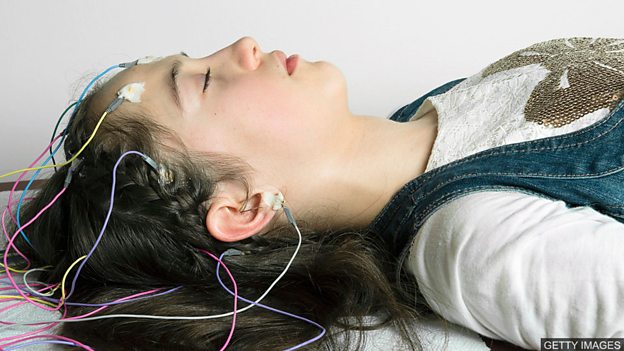每个人一生中大约有三分之一的时间都处于睡眠状态。一直以来,科学家对于人类为什么要睡觉,睡觉时大脑究竟处于什么状态等问题进行了多方面的深入研究。那么,当人类处于睡眠边缘状态时,身体里到底发生着什么变化?它又意味着什么?新的研究正在寻找这些答案。本集《随身英语》介绍有关人类睡眠边缘状态的研究。
课文内容
Vocabulary: sleep 词汇: 睡眠
How long does it take you to fall asleep? Are you out like a light as soon as your head hits the pillow, or does it take you more than a little time to doze off?
If the average night’s sleep is eight hours, or a third of a day, then it means we spend around one third of our lives in this dormant state. Science already has reams of data on the brain’s activity during sleep itself. Now, an international group of researchers at the University of Cambridge are researching that dopey state we all go through between wide awake and fast asleep.
This transitional period usually lasts between five and 20 minutes, says Sridhar Rajan Jagannathan, one of Cambridge’s Gates Scholars. However, people exhibit a variety of behaviour within this time. For some, going to the land of nod is a smooth, quick journey, while others have more difficulty. They “begin to get drowsy” and then snap out of it “back to alertness” he says.
The aim of the research is to find out how this pre-sleep phase, when the eyes glaze, the attention wanders and the mind is lulled, could be linked to accidents and dangerous mistakes. This could happen during the day while at work. “If you’re doing some boring task, you might be drowsy in this period. Small drift-offs can cause big problems,” says Mr Jangannathan. This is not just connected to safety concerns with driving, for example, but any task where concentration and decision making are important.
There are positive sides to this hypnagogic period too. Some experts think there is a connection to creativity and imagination. This is caused by a reduction in your inhibitions, which makes you more creative. You have more freedom to express yourself, and you’re more willing to make mistakes. It certainly seems to support the old adage of sleeping on it to solve a problem.
Ultimately, there are hopes that research into brain activity during falling asleep and waking might help stroke victims who are trying to regain lost physical functions. That could well be a pipe dream. There are also research efforts underway to find ways to warn of the onset of sleep, identifying changes in eye movements or brain activity. These could have practical applications for tired people operating heavy machinery and may help ensure that when it comes to accidents, we’re not caught napping.
词汇表
out like a light 迅速入睡
doze off 入睡
dormant 休眠的,沉睡的
dopey 迷迷糊糊的
wide awake 完全清醒的
fast asleep 熟睡的
the land of nod 在睡梦中
drowsy 半梦半醒的,睡意朦胧的
snap out of it 从…迅速恢复过来
alertness 清醒
glaze 发呆,(眼神)变呆滞
lull 使发困, 使安静
drift-off 渐渐入睡
hypnagogic 催眠的,入睡前的
sleeping on it 考虑一晚上,把…留到第二天再作决定
pipe dream 白日梦
catch someone napping 使某人措手不及、猝不及防
测验与练习
1. 阅读课文并回答问题。
1. How much of our lives do we spend asleep on average?
2. True or false: Everybody falls asleep in the same way.
3. What is the aim of this research?
4. How does the period before sleep enable creativity?
5. What practical medical application for this research is mentioned in the article?
2. 请在不参考课文的情况下完成下列练习。选择一个意思合适的单词填入句子的空格处。
1. John, put that down! Do you know how much caffeine there is in that drink? You won’t sleep! You’ll be ______ all night.
out like a light dopey wide awake alertness
2. Huh? What did you say? I’m sorry, a heavy lunch like the one we just ate always makes me ______.
dormant drowsy snap out of it caught napping
3. Unless we change our prices, we won’t be able to cover our overheads next month. Now that we know, we can act so we won’t be ______.
lulled a pipe dream caught napping sleep on it
4. For the peasants living in the middle ages, the idea of owning property or gold was just ______. It would never happen for them.
the land of nod hypnagogic snap out of it a pipe dream
5. John, what’s going on with you today? You are usually much quicker than this. Will you ______?
doze off dopey snap out of it sleep on it
答案
1. 阅读课文并回答问题。
1. How much of our lives do we spend asleep on average?
If the average night’s sleep is eight hours, or a third of a day, then it means we spend around one third of our lives in this dormant state.
2. True or false: Everybody falls asleep in the same way.
False. People exhibit a variety of behaviour within this time. For some, going to sleep is a smooth, quick journey, while others have more difficulty.
3. What is the aim of this research?
The aim of the research is to find out how this pre-sleep phase could be linked to accidents and dangerous mistakes.
4. How does the period before sleep enable creativity?
This state reduces your inhibitions, making you more creative. You have more freedom to express yourself, and are more willing to make mistakes.
5. What practical medical application for this research is mentioned in the article?
There are hopes this research might help stroke victims regain lost physical functions.
2. 请在不参考课文的情况下完成下列练习。选择一个意思合适的单词填入句子的空格处。
1. John, put that down! Do you know how much caffeine there is in that drink? You won’t sleep! You’ll be wide awake all night.
2. Huh? What did you say? I’m sorry, a heavy lunch like the one we just ate always makes me drowsy.
3. Unless we change our prices, we won’t be able to cover our overheads next month. Now that we know, we can act so we won’t be caught napping.
4. For the peasants living in the middle ages, the idea of owning property or gold was just a pipe dream. It would never happen for them.
5. John, what’s going on with you today? You are usually much quicker than this. Will you snap out of it?












